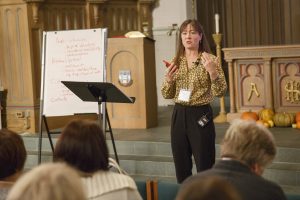By Stuart Mann
As a first-time attendee of the Toronto Children’s Ministry Conference, Tiffany Robinson came away with a wealth of knowledge and contacts. But it might be a sense of solidarity with other children’s ministers that she cherishes the most.

“To be in on an experience where several different groups pulled together and said, ‘This matters to us, let’s make the conversation happen,’ was really encouraging, and I would love to see more of it,” she says.
Ms. Robinson, the director of children’s ministry at Little Trinity in Toronto, was one of about 200 people from several denominations who gathered at Wycliffe College on Nov. 5 for a full day of workshops, networking and worship.
Since 2011, the conference has been held at St. John, York Mills and sponsored by the Centre for Excellence in Christian Education (CECE), a group of lay people and clergy in the diocese who are dedicated to promoting Christian education and formation for children and youth.
This year, the gathering was moved to Wycliffe College and co-sponsored by the CECE, Wycliffe College, the Diocese of Toronto and the Canadian Baptists of Ontario and Quebec. There were 15 workshops to choose from, including home-based discipleship, children’s spirituality, Messy Church, choosing a curriculum, recruiting and retaining volunteers, Godly Play and the role of grandparents in discipleship.

Ms. Robinson, who led a workshop on the challenges of leadership in children’s ministry, said the conference benefitted from having multiple sponsors and being held at the college, which is located at the University of Toronto. “Wycliffe’s ability to broadcast it widely meant that a lot of people heard about it and came,” she says.
Among those in attendance were Anglicans, Catholics, Baptists, Pentecostals, Presbyterians and members of the Christian Missionary Alliance. “It was really great to sit in a room with people of different denominations and have a constructive conversation around this particular ministry,” she says.
The wide variety of workshops, led by people with on-the-ground experience, was another big draw, she adds. “The fact that you knew if you showed up you were going to receive a good number of takeaways for your work – that was a big motivator. The range of people they managed to recruit to come teach was fantastic.”

In addition to the camaraderie, the conference also provided a wealth of resources in one place. “I find one of the challenges of children’s ministry is that there isn’t really a central clearing house with enough content to support a vibrant children’s ministry,” says Ms. Robinson. “This was an experience where there was beginning to be a centralized conversation around it, and that it was Canadian and somewhat local.”
She adds: “I was really encouraged to see institutions working together around a common valuing of children’s ministry, and a sense that the work we do in discipling children is crucial and critical to the health of the church.”
For more information about the conference, visit the Wycliffe College website.